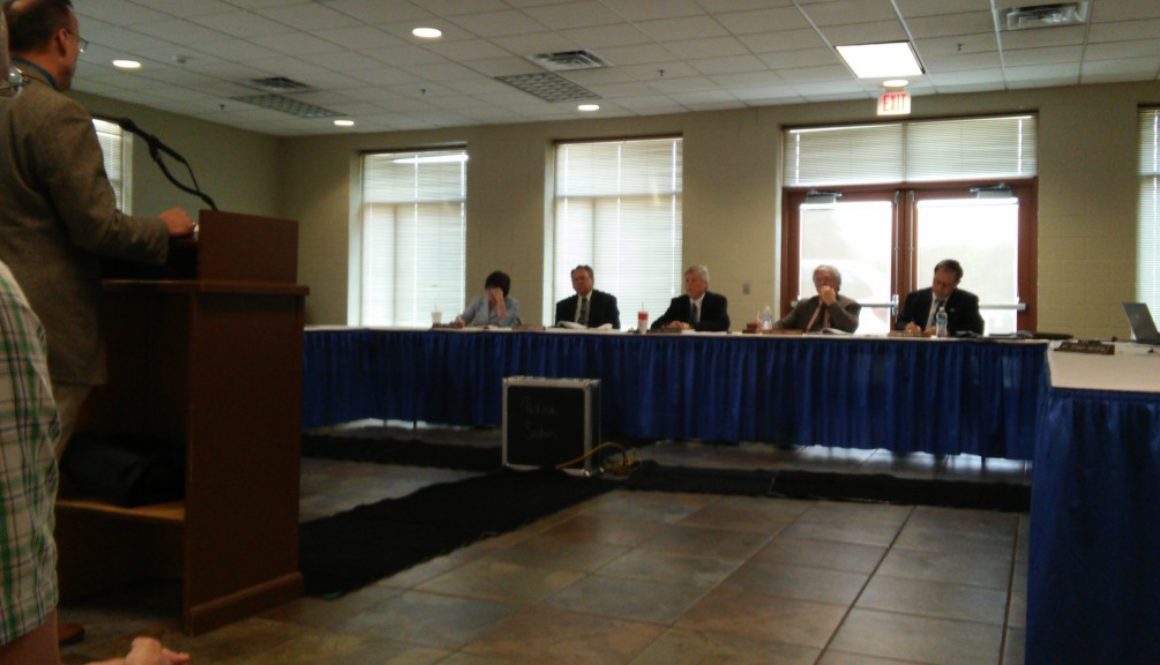It was another disappointing NC Pesticide Board meeting this week as only 4 Board members out of 7 were present and the maintaining the status quo mentality prevailed again. Some lowlights from the meeting include, the denial of funding a study from NC State that could potentially show the cumulative effects of DEET, fipronil, and permethrin, a dismissal of the detrimental impact of neonicotinoid water contamination on the North Carolina blue crab industry, and continuously low fines for those that knowingly and unknowingly violate NC pesticide law. Read the full recap below:
NC Pesticide Board Meeting
1/12/2016
Board members present – Dr. Thomas Scarborough (Vice Chairman); Dr. W. Benson Kirkman; Dr. Colleen Hudak-Wise; and Mr. Don Rodgers
Consider exemption request from the requirements of 02NCAC 09L.1003 (3)
Chris Elder, Gypsy Moth Program Manager within the Plant Industry Division of the NC Department of Agriculture and Consumer Services (NCDA&CS), requested an exemption from 02NCAC 09L.1003 (3), which states:
“All pesticides applied aerially as dry granules or pellets shall be released within 40 feet above the canopy of the target, except where obstructions in or adjacent to the target would endanger the safety of the pilot while applying pesticides at that altitude.”
This exemption would allow aerial pesticide applicators to release a pheromone that the NCDA&CS uses to combat the Gypsy Moth at an altitude great than 40 feet. The NCDA&CS must get exemption approval on a yearly basis.
This exemption request was unanimously approved
Worker Protection Update
Pat Jones, Deputy Director of Pesticide Programs with the NCDA&CS, gave a presentation to the Board on the recent revisions to the Worker Protect Standards released by the EPA in November 2015. He went over the implementation timeline, which mandates that all rule changes must be implemented by January 2018.
Pesticide Environmental Trust Fund, Request for Funding
Dr. Henry Wade, Environmental Programs Unit Manager within the NCDA&CS requested $60,000 from the Pesticide Environmental Trust Fund for the Plastic Pesticide Container Recycling Program for 2016. The break down for the funding is as follows:
$51,875 – County Grants to implement and/or maintain a program
$5,000 – promotional materials
$3,125 – John L. Smith Award Program
This funding request was unanimously approved
Pesticide Environmental Trust Fund, Request for Funding – Updated Budget Request – Recommendations for Human Health Risks and Development Diagnostics to Exposure to Environmental Chemicals in North Carolina
Dr. R. Michael Roe, Professor at NC State University, requested $43,000 to conduct a study on the genetics effects of exposure to DEET, fipronil, and permethrin at field relevant doses. This was his second time presenting this request to the Board after the first request was denied due to questions in his budget. Dr. Roe prepared answers to these questions and provided more information regarding the relevance of the study and the manner in which it would be conducted. Dr. Scarborough of the NC Pesticide Board made several comments regarding how the Board “has usually funded applied research and not basic research as Dr. Roe has requested.” He also asked if the frequency of exposure to these chemicals in reality is comparable to that describe in the proposed methodology of the study. Dr. Roe said that it was comparable and would contribute to the minimal body of knowledge on the effects of chemical combinations in human bodies. Dr. Kirkman of the NC Pesticide Board comment that he felt that it was within the Board’s purview to fund such a study and that it could provide some useful information. Dr. Kirkman made a motion to fund the study as budgeted, however, no Board members seconded the motion, so the request was denied.
Dr. Kirkman motioned to fund the request, but no other Board members seconded, so the request was denied
Presentation on the Effects of pesticides, specifically neonicotinoids, on NC Blue Crab and the economic impacts of exposure
I stand before you again today to bring another piece of evidence to your attention of the detrimental impact of neonicotinoid pesticides on human, environmental, and economic health. Since we previously met in November of 2015, there is more evidence that comes out on an almost daily basis linking this class of pesticides to water contamination, and thereby, disruption of both aquatic and terrestrial ecosystems. Today, I wanted to bring your attention to the observed impact of neonicotinoids, specifically imidacloprid, on post-larval and juvenile blue crab.
The study that I have presented to you in your Board packets was published in the Journal of Experimental Marine Biology and Ecology in 2012 and was conducted by Dr. Joshua Osterberg et al at the Duke University Marine Laboratory here in North Carolina. This study examined the developmental effects and actute toxicity of several types of pesticides on blue crab megalopae and juveniles. The study found that imidacloprid had the second greatest acute toxicity impact on blue crab megalopae and juveniles, with the first being a pyrethroid. Furthermore, when studying the effects of imidacloprid on juveniles’ molting habits, it was found that 41.18% of juveniles treated with imidacloprid were found dead after molting. These statistics should raise some serious concerns within the Pesticide Board given how pervasive imidacloprid is in our agricultural system, and what the implications might be on North Carolina’s blue crab and commercial fishing industry.
According to the 2014 Commercial and Recreational Statistics Bulletin, there were 25.2 million pounds of commercial hard blue crab caught in North Carolina, valued at almost $30 million, making up almost a third of the entire commercial fishing industry in North Carolina. This number shows the obvious economic impact of the blue crab on the commercial fishing industry in North Carolina. Furthermore, this number does not show the amount of blue crab and/or other species of aquatic life that subsistence fishermen pull in every year. Given the size of blue crab industry in North Carolina, the impact of any chemical on this industry should be taken seriously, examined thoroughly, and regulated when appropriate. This issue is of great concern to not only Toxic Free NC’s supporters, but also fishermen, academics, and other citizens from around the state.
I also wanted to remind the Board that it is within the authority of the Board to adopt rules restricting or prohibiting the sale and use of pesticides in designated areas during specified time periods. In adopting rules under this subsection, the Board shall consider factors required to prevent damage or injury to the following by the drift or misapplication of pesticides. This list includes:
- Plants, including forage plants, on adjacent or nearby land;
- Wildlife in the adjourning or nearby areas;
- Fish and other aquatic life in waters in reasonable proximity to the area to be treated; or
- Other animals, persons or beneficial insects
Given this growing body of evidence showing the detrimental impacts of neonicotinoids on human, environmental, and economic health of the state of North Carolina I am asking the Board to investigate water contamination within the state and act to protect the vitality its people and their livelihood.
Thank you.
Preston Peck, Policy Advocate
Toxic Free NC
Dr. Scarborough thanked Mr. Peck for the presentation and recited some information that he received from Dr. Dan Dyer, toxicologist at Bayer Crop Science, regarding specific levels of neonicotinoid contamination in parts per billion. At Mr. Peck’s inquiry, Dr. Scarborough also acknowledged that Bayer had the initial patient on imidacloprid, the active ingredient in question, and is still one of the leading manufacturers of products containing imidacloprid.
Settlement Agreements for Violations of Pesticide Law
N.C. Department of Agriculture and Consumer Services, Structural Pest Control and Pesticide Division v.
For a full list of Violators, Description of Violations, and Settlement Fines, please click below:
Settlement Agreements Chart




